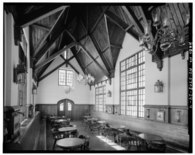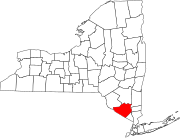West Point, New York
West Point, New York | |
|---|---|
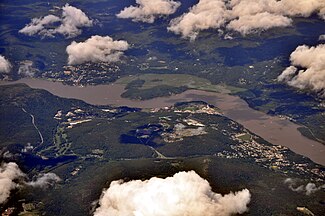 Aerial view of West Point (at the center), the Hudson River, Highland Falls (on right), Cold Spring (on left) across the river in Putnam County | |
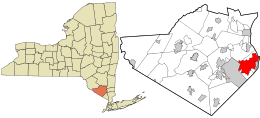 Location of West Point in Orange County, New York (right) and of Orange County in New York state (left) | |
| Coordinates: 41°23′42″N 73°57′18″W / 41.39500°N 73.95500°W | |
| Country | United States |
| State | New York |
| County | Orange |
| Town | Highlands |
| Area | |
| • Total | 19.34 sq mi (50.08 km2) |
| • Land | 18.43 sq mi (47.75 km2) |
| • Water | 0.90 sq mi (2.33 km2) |
| Population (2020) | |
| • Total | 7,341 |
| • Density | 398.21/sq mi (153.75/km2) |
| Time zone | UTC−5 (Eastern (EST)) |
| • Summer (DST) | UTC−4 (EDT) |
| ZIP Codes | 10996–10997 |
| Area code | 845 |
| FIPS code | 36-80747[2] |
West Point is the oldest continuously occupied military post in the United States. Located on the Hudson River in New York, General George Washington stationed his headquarters in West Point in the summer and fall of 1779 during the American Revolutionary War, and later called it "the most important Post in America" in 1781 following the war's end. West Point also was the site of General Benedict Arnold's failed attempt at treason during the Revolutionary War.
West Point was first occupied by the United States Armed Forces in January 1778, when Brigadier General Samuel Holden Parsons and his brigade occupied West Point. From then to the present, West Point has been occupied by the United States Army. It comprises 25.1 sq mi (65 km2) land and water including the campus of the United States Military Academy, which is commonly called "West Point" as well.
West Point is a census-designated place (CDP) located in the town of Highlands in Orange County, located on the western bank of the Hudson River. The population was 7,341 at the 2020 census. It is part of the New York–Newark–Jersey City, NY–NJ–PA Metropolitan Statistical Area as well as the larger New York–Newark, NY–NJ–CT–PA Combined Statistical Area.
History
[edit]American Revolutionary War
[edit]Construction
[edit]The site for West Point was originally picked because of the pronounced S-curve in the Hudson River at that point during the American Revolutionary War, and was the subject of a committee reporting on fortifications in the Hudson River in November 1775, which first recommended occupying the land.[3] Construction of the fort was begun under Captain Louis de la Radiere[4] as chief engineer of the fort, however, New York Governor George Clinton thought that Radiere was "lacking" in the knowledge needed to hold his position.[3] Thus it was completed under Polish Colonel Tadeusz Kościuszko between 1778–1780; it was a key defensive fortification, overlooking the turn in the Hudson River and the Great Chain.[5] On January 27, 1778, Brigadier General Samuel Holden Parsons and his brigade, including elements of Connecticut Colony's patriot militia, crossed an iced over Hudson River and climbed to the plain on West Point.[6]
General George Washington watched the construction of the fort closely and considered the fort to be General Alexander McDougall's "first priority".[3]
In 1778, Major General Israel Putnam wrote, "The place agreed upon to obstruct the navigation of Hudson river was at West Point." A fort there, Fort Clinton, named after the governor's brother, Colonel James Clinton[a] (whose brigade built the main fort), was built as well. The southern and western walls were nine feet high and twenty feet thick. Three redoubts and batteries on the south were named Forts Meigs, Wyllys, and Webb.[8]: 53, 55

After construction
[edit]West Point was staffed by a small garrison of Continental Army Soldiers from early in 1776 through the end of the war. A great iron chain was laid across the Hudson at this point in 1778 in order to prevent British Navy vessels from sailing further up the Hudson River, which was never tested by the British.[9]
The site comprised multiple redoubts, as well as Fort Putnam, situated on a high hill overlooking the river. Named after its builder, Revolutionary War General and engineer Rufus Putnam, the fort is still preserved in its original design.[10][11]
Near losses
[edit]Capture of Stony Point and Verplanck's Point
[edit]Parliament sent instructions to General Sir Henry Clinton to force George Washington out of West Point. Clinton decided to capture the strategically important posts Stony Point and Verplanck's Point,[12] which were twelve miles south of West Point. Clinton captured the forts on June 1, 1779. To block the British advance, Washington moved his troops further up the Hudson.[3][13]
Betrayal of Benedict Arnold
[edit]Early on in May 1779, General Benedict Arnold had met with a Philadelphia merchant named Joseph Stansbury. Afterwards, Stansbury had gone to Sir Henry Clinton, to whom he offered Arnold's "services". Clinton had been pursuing a campaign to take control of the Hudson River, so he had been interested in the plans and information of the defenses of West Point and other defenses on the Hudson River. Arnold wrote a series of letters to Clinton, one of which was written on July 12, making explicit the offer to surrender West Point to the British, later for a finalized offer of £20,000. On August 3, 1780, Arnold obtained command of West Point, which also gave him command of the American-controlled portion of the Hudson. Arnold then intentionally started weakening the fort's defenses, and through a letter sent to Clinton, proposing a meeting with British Major John André to discuss information on West Point. A meeting was set for September 11, however, Arnold and André did not meet until September 21. Carrying the plans for West Point, André was captured on September 23 by three militiamen, and the information to West Point was found.[14] After Arnold's betrayal, the fort, which was also known as Fort Arnold at the time, was renamed to Fort Clinton after General James Clinton.[15]
Post-war
[edit]After the conclusion of the American Revolution, West Point was used as a storage facility for cannon and other military property used by the Continental Army[16] and until November 28, 1779, was used as the temporary headquarters to George Washington, who called it "the most important Post in America" in 1781. Viewing a standing army as "dangerous", Congress demobilized American forces but left fewer than a hundred men at West Point.[3] However, it was still the largest post in the army in the immediate years after the Revolutionary War.[17]

Favoring West Point due to its location and defenses, Henry Knox and Alexander Hamilton made the first official recommendation to establish a military academy at West Point in 1790. However, Congress rejected the proposal, although earlier in 1790, New York merchant and American Revolution patriot Stephen Moore sold his estate (known as "Moore's Folly") to the United States, following an Act of Congress that solidified the sale[18] on September 10, 1790, for $11,085,[19] which meant Congress had gained full possession of the fort.[3] The United States Military Academy was established at West Point in 1802.[20][21] It is the nation's oldest service academy,[22] and is metonymically called "West Point" as well.[23] West Point has the distinction of being the longest continuously occupied United States military installation.[7]
Geography and climate
[edit]
West Point is located at 41° 23′ 42" N 73° 57' 18" W (41.395° N 73.955° W). According to the United States Census Bureau, the CDP has a total area of 25.1 sq mi (65 km2); 24.3 sq mi (63 km2) land and 0.7 sq mi (1.8 km2) water. It is located in the town of Highlands and is in Orange County.[24][25] West Point and the contiguous village of Highland Falls are on the western bank of the Hudson River.[26]
West Point has a humid continental climate (Köppen Dfa),[27] with four distinct seasons.[28] Summers are hot and humid, while winters are cold with moderate snowfall.[29] The monthly daily average temperature ranges from 27.5 °F (−2.5 °C) in January to 74.1 °F (23.4 °C) in July.[30] The average annual precipitation was approximately 51.47 in (1,310 mm) from 1991-2020; snow averaged at 35.7 in (91 cm) from 1991-2020, although this total may vary considerably from year to year.[31] Extremes in temperature range from 106 °F (41 °C) on July 22, 1926, down to −7 °F (−22 °C) on January 22, 1984.[30]
| Climate data for West Point, New York (1991–2010 normals, extremes 1890–present) | |||||||||||||
|---|---|---|---|---|---|---|---|---|---|---|---|---|---|
| Month | Jan | Feb | Mar | Apr | May | Jun | Jul | Aug | Sep | Oct | Nov | Dec | Year |
| Record high °F (°C) | 71 (22) |
77 (25) |
86 (30) |
96 (36) |
97 (36) |
102 (39) |
106 (41) |
105 (41) |
105 (41) |
92 (33) |
82 (28) |
72 (22) |
106 (41) |
| Mean daily maximum °F (°C) | 35.8 (2.1) |
38.9 (3.8) |
47.4 (8.6) |
60.4 (15.8) |
71.5 (21.9) |
79.9 (26.6) |
85.2 (29.6) |
83.3 (28.5) |
76.0 (24.4) |
63.4 (17.4) |
51.4 (10.8) |
40.7 (4.8) |
61.2 (16.2) |
| Daily mean °F (°C) | 28.2 (−2.1) |
30.6 (−0.8) |
38.5 (3.6) |
50.4 (10.2) |
61.1 (16.2) |
69.8 (21.0) |
75.3 (24.1) |
73.6 (23.1) |
66.4 (19.1) |
54.5 (12.5) |
43.5 (6.4) |
33.9 (1.1) |
52.1 (11.2) |
| Mean daily minimum °F (°C) | 20.7 (−6.3) |
22.4 (−5.3) |
29.5 (−1.4) |
40.5 (4.7) |
50.6 (10.3) |
59.8 (15.4) |
65.4 (18.6) |
63.9 (17.7) |
56.7 (13.7) |
45.6 (7.6) |
35.5 (1.9) |
27.1 (−2.7) |
43.1 (6.2) |
| Record low °F (°C) | −15 (−26) |
−17 (−27) |
−2 (−19) |
8 (−13) |
25 (−4) |
40 (4) |
40 (4) |
35 (2) |
28 (−2) |
20 (−7) |
5 (−15) |
−16 (−27) |
−17 (−27) |
| Average precipitation inches (mm) | 3.82 (97) |
2.95 (75) |
4.04 (103) |
4.00 (102) |
3.84 (98) |
4.61 (117) |
4.57 (116) |
4.96 (126) |
4.57 (116) |
5.29 (134) |
4.23 (107) |
4.59 (117) |
51.47 (1,307) |
| Average snowfall inches (cm) | 11.1 (28) |
7.1 (18) |
9.6 (24) |
0.4 (1.0) |
0.0 (0.0) |
0.0 (0.0) |
0.0 (0.0) |
0.0 (0.0) |
0.0 (0.0) |
0.0 (0.0) |
0.5 (1.3) |
7.0 (18) |
35.7 (91) |
| Average precipitation days (≥ 0.01 in) | 9.8 | 8.3 | 9.3 | 10.5 | 11.8 | 11.4 | 9.8 | 9.6 | 8.2 | 9.6 | 9.0 | 10.4 | 117.7 |
| Average snowy days (≥ 0.1 in) | 3.8 | 2.4 | 2.0 | 0.2 | 0.0 | 0.0 | 0.0 | 0.0 | 0.0 | 0.0 | 0.2 | 1.9 | 10.5 |
| Source: NOAA[32][30] | |||||||||||||
Demographics
[edit]| Census | Pop. | Note | %± |
|---|---|---|---|
| 2010 | 6,763 | — | |
| 2020 | 7,341 | 8.5% | |
| U.S. Decennial Census[33] | |||
As of the census of 2020, there were 7,341 people, and 860 households residing in the CDP, with the average household size being 3.79 persons per household. The population density was 398.2 inhabitants per square mile (153.7/km2). The racial makeup of the CDP was 69.3% white, 5.4% African American, 0.2% Native American, 4.4% Asian, 0.2% Pacific Islander, and 10.3% from two or more races. Hispanic or Latino of any race were 12.0% of the population. The age distribution is 23.5% under the age of 18, and 0.4% who were 65 years of age or older.[34]
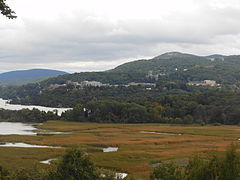
There were 860 households, out of which 79.5% were a married couple family household, 16.4% had a female householder with no spouse present, and 3.3% had a male householder with no spouse present.[35] The average household size was 3.79. The median income for a household in the CDP was $121,219.[34]
About 2.3% of the population is below the poverty line.[34]
West Point Mint
[edit]In 1937, the West Point Bullion Depository was constructed and in 1938 opened to store silver bullion.[36] In 1988, it became the West Point Mint, as a branch of the United States Mint[37] and gained official status as a branch of the United States Mint on March 31 of that year.[38] The West Point Mint has a deep storage of 54,067,331.379 fine troy ounces of gold.[39] It sits on a 4-acre (1.6 ha) parcel of land.[40]
Notable people
[edit]- Tony Hale, actor[41]
- Edith Hoyt, painter[42]
- Alfred Thayer Mahan, naval historian[43]
- Ricky Steamboat, professional wrestler[44]
- Gore Vidal, author[45][46]
Transportation
[edit]U.S. Route 9W, combined with NY Route 218 run north-south through West Point. New York Route 293 also runs northeast-southwest through the post. Running through the lower portion of the town is U.S. Route 6, combined with the upper extent of the Palisades Interstate Parkway.
The New York Central Railroad well into the 1950s operated several passenger trains a day on the West Shore Railroad through the academy's Gothic style station; both the limited stop trains bound for Albany and the local trains to Newburgh and Kingston made stops at the station. Service finally ended in 1958.[47][48][49]
Train station gallery
[edit]-
View of the West Shore Railroad station, looking north (ca. 1980)
-
View of station, looking south (ca. 1980)
-
Station interior
-
Entry door, trackside view
Education
[edit]Highland Falls-Fort Montgomery Central School District is the local school district.[50] James I. O'Neill High School is its high school.[51]
The Department of Defense Education Activity (DoDEA) maintains elementary and middle schools for children of military personnel on-post at USMA,[52] but sends high school aged students who are dependents of on-base military personnel to O'Neill.[51] In March 2022 USMA's contract with O'Neill was renewed.[53]
See also
[edit]Explanatory notes
[edit]References
[edit]- ^ "ArcGIS REST Services Directory". United States Census Bureau. Archived from the original on January 19, 2022. Retrieved September 20, 2022.
- ^ "U.S. Census website". United States Census Bureau. Archived from the original on December 27, 1996. Retrieved January 31, 2008.
- ^ a b c d e f "West Point". George Washington's Mount Vernon. Archived from the original on July 5, 2023. Retrieved July 5, 2023.
- ^ J. E. Kaufmann (2004). Fortress America. Tomasz Idzikowski (illus.). Da Capo Press. p. 117. ISBN 978-0-306-81294-1.
de la radiere.
- ^ "West Point". A Revolutionary Day. Archived from the original on March 11, 2009. Retrieved February 11, 2009.
- ^ Crackel (1991), p. 41.
- ^ a b "Fort Clinton". American Battlefield Trust. Archived from the original on July 7, 2023. Retrieved July 7, 2023.
- ^ Storozynski, A., 2009, The Peasant Prince, New York: St. Martin's Press, ISBN 9780312388027
- ^ Diamant, Chaining the Hudson, p. 122
- ^ Hubbard, Robert Ernest. Major General Israel Putnam, pp. 157–158, McFarland & Company, Inc., Jefferson, North Carolina, 2017. ISBN 978-1476664538.
- ^ Livingston, William Farrand. Israel Putnam: Pioneer, Ranger, and Major-General, 1718–1790, pp. 373–375, G. P. Putnam's Sons, New York and London, 1901.
- ^ "Battle of Stony Point". George Washington's Mount Vernon. Archived from the original on July 7, 2023. Retrieved July 7, 2023.
- ^ Philbrick, Nathaniel (2016). Valiant Ambition: George Washington, Benedict Arnold, and the Fate of the American Revolution (6th ed.). Penguin Random House. pp. 247–249. ISBN 9780143110194.
- ^ Randall, Willard Sterne (1990). Benedict Arnold: patriot and traitor. New York, N.Y: Morrow. ISBN 978-1-55710-034-4.
- ^ "Benedict Arnold". www.ushistory.org. Archived from the original on February 27, 2023. Retrieved July 5, 2023.
- ^ "A Century of Lawmaking for a New Nation: U.S. Congressional Documents and Debates, 1774 - 1875". memory.loc.gov. Archived from the original on February 23, 2023. Retrieved July 5, 2023.
- ^ Ambrose, pages 9–10.
- ^ Miller, Agnes (1952). "Owner of West Point". New York History. 33 (3): 303–312. ISSN 0146-437X. JSTOR 23153463. Archived from the original on February 18, 2023. Retrieved February 18, 2023.
- ^ Boynton, Edward Carlisle (1871). History of West Point: And Its Military Importance During the American Revolution: and the Origin and Progress of the United States Military Academy. D. Van Nostrand.
- ^ McDonald (2004), p. 184
- ^ Ambrose (1966), p. 22.
- ^ Wolf, Zachary (June 6, 2019). "West Point has an outsize importance in US history". CNN. Archived from the original on July 11, 2023. Retrieved July 10, 2023.
- ^ Wire, S. I. "Army unveils new name, uniforms and logo in athletics rebrand". SI.com. Archived from the original on April 1, 2019. Retrieved July 11, 2023.
- ^ Highlands town, New York.[permanent dead link] U.S. Census Bureau. Retrieved on August 25, 2011.
- ^ "West Point CDP, New York".[permanent dead link] U.S. Census Bureau. Retrieved on August 25, 2011.
- ^ Cheslow, Jerry (May 15, 1994). "If You're Thinking of Living In/ Highland Falls; In the U.S. Military Academy's Shadow". The New York Times. ISSN 0362-4331. Archived from the original on July 13, 2023. Retrieved July 13, 2023.
- ^ "West Point, New York Köppen Climate Classification (Weatherbase)". Weatherbase. Archived from the original on July 13, 2023. Retrieved July 13, 2023.
- ^ "Overview". American Museum of Natural History. Archived from the original on July 13, 2023. Retrieved July 13, 2023.
- ^ "Climate in West Point, New York". bestplaces. Archived from the original on July 13, 2023. Retrieved July 13, 2023.
- ^ a b c "Station: West Point, NY". U.S. Climate Normals 2020: U.S. Monthly Climate Normals (1991-2020). National Oceanic and Atmospheric Administration. Archived from the original on August 11, 2021. Retrieved August 11, 2021.
- ^ "NOAA NCEI U.S. Climate Normals Quick Access". www.ncei.noaa.gov. Archived from the original on May 5, 2021. Retrieved December 15, 2023.
- ^ "NowData - NOAA Online Weather Data". National Oceanic and Atmospheric Administration. Archived from the original on January 18, 2022. Retrieved August 11, 2021.
- ^ "Census of Population and Housing". Census.gov. Archived from the original on September 12, 2015. Retrieved June 4, 2016.
- ^ a b c "U.S. Census Bureau QuickFacts: West Point CDP, New York". U.S. Census Bureau. Archived from the original on October 9, 2023. Retrieved July 13, 2023.
- ^ "Explore Census Data". data.census.gov. Archived from the original on July 13, 2023. Retrieved July 13, 2023.
- ^ "History of the U.S. Mint". United States Mint. April 3, 2018. Archived from the original on July 5, 2018. Retrieved July 11, 2023.
- ^ "The United States Mint at West Point". usmint.gov. Archived from the original on December 18, 2016. Retrieved August 23, 2017.
- ^ "The West Point Mint Facility". Gold Coins Trader. Archived from the original on March 31, 2012. Retrieved January 19, 2013.
- ^ "U.S. Treasury-Owned Gold | U.S. Treasury Fiscal Data". fiscaldata.treasury.gov. Archived from the original on June 2, 2023. Retrieved July 11, 2023.
- ^ Daddio, William F. (May 28, 1987). "National Register of Historic Places nomination, U.S. Bullion Despository, West Point". New York State Office of Parks, Recreation and Historic Preservation. Archived from the original on March 4, 2016. Retrieved July 28, 2010.
- ^ Myers, Marc (March 26, 2019). "Tony Hale Turned His Childhood Anxieties Into Comic Relief". Wall Street Journal. ISSN 0099-9660. Archived from the original on July 13, 2023. Retrieved July 13, 2023.
- ^ "Artists in Canada". Canadian Heritage. Government of Canada. Archived from the original on March 29, 2019. Retrieved December 18, 2018.
- ^ "Mahan, Alfred Thayer". NHHC. Retrieved July 13, 2023.
- ^ "Ricky Steamboat: Profile & Match Listing - Internet Wrestling Database (IWD)". www.profightdb.com. Archived from the original on July 13, 2023. Retrieved July 13, 2023.
- ^ "Gore Vidal". Academy of Achievement. Archived from the original on March 29, 2023. Retrieved July 13, 2023.
- ^ "Gore Vidal | Encyclopedia.com". www.encyclopedia.com. Archived from the original on July 13, 2023. Retrieved July 13, 2023.
- ^ 'Official Guide of the Railways,' December 1954, New York Central section, Table 80
- ^ "Comments On The West Shore from James Knecht". Nyc.railfan.net. Archived from the original on September 12, 2018. Retrieved January 19, 2018.
- ^ "New York Central Railroad, Table 80". Official Guide of the Railways. 82 (3). National Railway Publication Company. August 1949.
- ^ "2020 CENSUS - SCHOOL DISTRICT REFERENCE MAP: Orange County, NY" (PDF). U.S. Census Bureau. Archived (PDF) from the original on May 22, 2022. Retrieved July 4, 2022.
- ^ a b Wang, Helu (September 27, 2021). "Could Highland Falls lose its West Point students?". Times Herald-Record. Archived from the original on July 5, 2022. Retrieved July 5, 2022.
- ^ "West Point Community". Department of Defense Education Activity. Archived from the original on July 5, 2022. Retrieved July 4, 2022. - Elementary site Archived July 6, 2022, at the Wayback Machine and Middle site Archived July 5, 2022, at the Wayback Machine
- ^ Randall, Mike (March 21, 2022). "Highland Falls' contract to educate West Point high school students is renewed". Times Herald-Record. Archived from the original on September 23, 2022. Retrieved July 5, 2022.
External links
[edit]- Visit Orange County West Point, NY
- . . 1914.




